Postpartum confinement care: Should a new mum stay in a confinement centre or get home help after birth?
Options for new mums include hiring a confinement nanny, staying at a confinement centre, asking a relative to help you at home or doing it yourself. CNA Women breaks down the pros and cons of each.
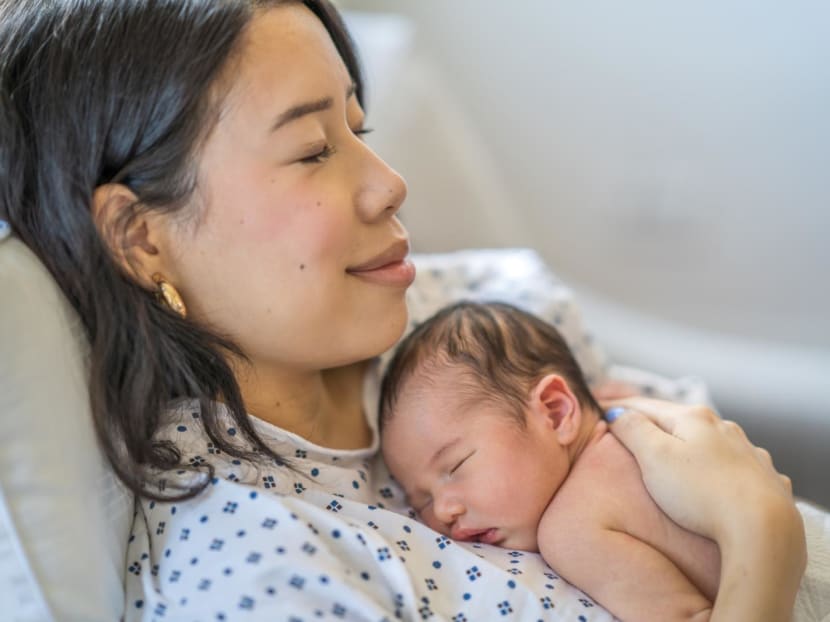
Singapore women have several options when it comes to postpartum confinement care. (Photo: iStock/FatCamera)

This audio is generated by an AI tool.
The post-natal confinement period is a time for new mothers to recover from the baby’s birth and can last from 30 to 100 days, depending on different cultural practices.
It’s a time for the mums to be taken care of with nutritious food, post-natal practices and help with the newborn.
Options for confinement care in Singapore include staying at a confinement centre, hiring a live-in confinement nanny, getting help from a relative (like your mum, mother-in-law or aunt), or doing it on your own.
Whichever you choose, prioritise your well-being and your family’s, says freelance artist Michelle Goh, who had her firstborn during the pandemic. “Motherhood is a marathon – the first 30 days are just the beginning,” she said.
CONFINEMENT NANNY
Includes both freelance nannies and nannies from confinement agencies.
THE PROS
Home comforts. Besides being in familiar surroundings, you’ll be able to figure out how to fit your newborn into the home routine from day one.
Personalised care and attention. A confinement nanny’s duties include caring for your newborn and you, cooking confinement food (which may include doing the marketing) and guiding you on basic infant care. Some even help with laundry and cleaning.
Ask the nanny to tailor to your preferences, for example, if there are certain foods you don’t eat or if you would like to breastfeed your newborn fully.
CONFINEMENT CARE TIPS FROM MUMS
1. Trust your confinement nanny, said HR professional Nisha Booluck, who struggled with this. “The maternal instinct is so strong that I became super defensive of my baby. But it is important to try and trust the process, and take it easy for a bit.”
2. Michelle Chia, a family manager and mum of three, recommends speaking with mummy friends about their expectations and experiences. “You can even ask them what their red flags are in determining if you should change your confinement lady.”
3. To avoid conflict, Caryn Lim, a mum of three and founder of a home medispa company, advises you speak with the confinement nanny beforehand. “Know their preferences – formula vs breastfeeding, health concerns and diet preferences. All these may seem ‘minor’ but could potentially be bigger issues when you have to live together for a period of time.”
THE CONS
Loss of privacy. You’ll have to adapt to having a stranger living in your home for at least a month.
Said family manager and mum of three, Michelle Chia: “I had to get used to having a stranger in my house. And because it was during the pandemic, we were unable to meet with or speak to the confinement agency’s nanny prior, so there was some awkwardness between us as we didn’t know what to expect from each other.”
Personality clashes. Differences in cultural practices, expectations and personality between the confinement nanny and yourself, and even your domestic helper, could lead to friction.
Caryn Lim, a mum of three who owns a home medispa company, experienced this. “The confinement nanny did not get along well with my helper and that was quite a challenge for me,” she said.
“On top of caring for my newborn and myself, handling the relationship issues between them was the last thing I needed. I had to get my husband to help manage their issues so that the three-month confinement period would go smoother.”
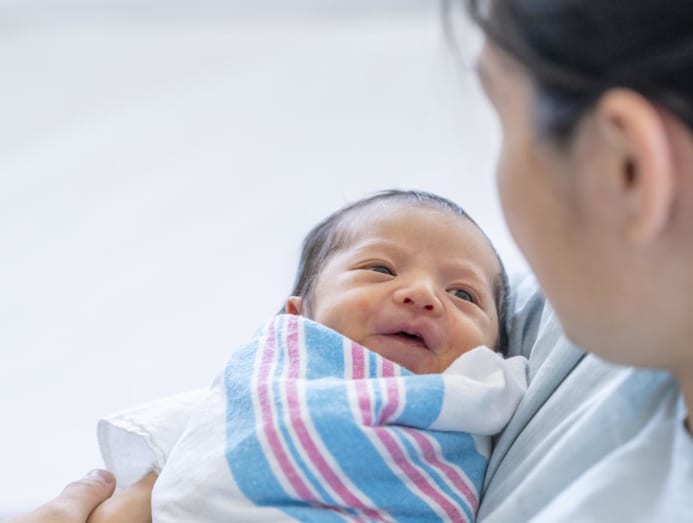
HR professional Nisha Booluck found it difficult to communicate with her confinement nanny. “The nanny herself seemed uncertain at times and would ask us why our baby would be doing certain things when we were expecting her to tell us the reason.
“Eventually, I gathered that she had had bad experiences sharing her opinions with other new parents who would take her comments badly.”
Cost. CNA Women found out that, on average, hiring a confinement nanny for a 28-day period can start from S$3,000, with prices increasing for very experienced and in-demand nannies.
You’d also need to factor in price increases during festive seasons – say, Chinese New Year – and whether the nanny will be caring for a single baby, twins or triplets.
Booluck, who is from Mauritius, said that she and her husband paid an additional S$350 to the confinement agency for an English-speaking nanny.
In addition, if your confinement nanny is coming over from Malaysia, you’ll need to apply for her work permit and include the MOM levy; nannies hired through a confinement agency should already have their paperwork settled by the company.
Also factor in a hongbao for the nanny to thank her when she leaves.
Last-minute cancellations. Due to unforeseen circumstances, a freelance confinement nanny may not be able to take the job as agreed upon. Scrambling to find a replacement can put extra stress on your pregnancy.
However, if you use a confinement agency, it should be able to find a replacement for you.
CONFINEMENT CENTRE
These offer a wide range of postpartum recovery services and this live-in option is becoming popular with new parents.
THE PROS
A one-stop shop. All your confinement needs are taken care of, from help with breastfeeding, nutritious meals, postnatal massages and infant care. Some centres even offer beauty treatments such as facials and hair washes, and exercise classes like postnatal yoga.
Professional medical care. Most confinement centres have a nursery as well as medical professionals on-site to monitor your health and your baby’s, providing medical check-ups and addressing postnatal concerns during your stay.
Freelance artist and first-time mother Michelle Goh, who delivered her baby during the pandemic, placed having 24/7 professional care for her newborn as top priority. “I truly wanted peace of mind, otherwise, I would not be able to rest well and recover, much less take care of my mental state, postpartum.”
During the first week of her stay, Goh discovered that she had exceptionally high blood pressure. “It was not something I knew to look out for and it was dangerous.” But thanks to the nurses and regular monitoring, the situation was kept in-check.
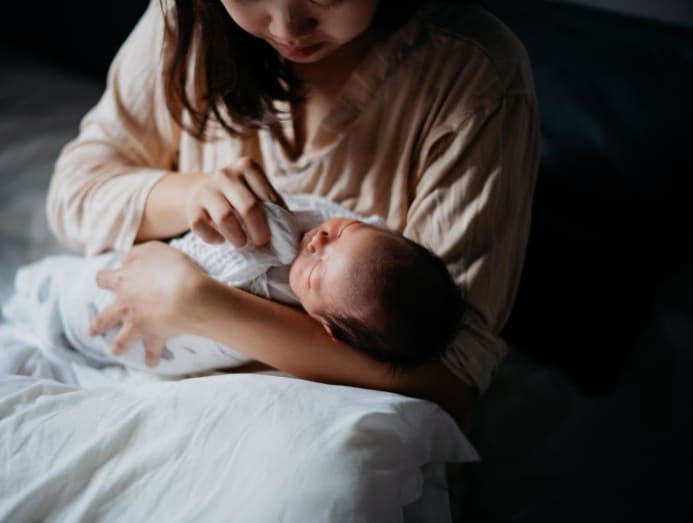
Connecting with fellow mums. Other new mums can become your support as you navigate this often-overwhelming postpartum period.
Goh said that her confinement centre, Kai Suites, had weekly suppers for the new fathers. “My husband and I made friends with the other parents, and we’re still friends today.”
THE CONS
Cost. Expect to fork out from S$7,800 for a seven-day stay at a confinement centre like Kai Suites to S$45,800 for 56 days at SingJoy Confinement Centre.
Missed mother-baby bonding opportunities. With a fixed schedule and routine, you might not have the flexibility to bond with your baby as much as you would like. This could also be challenging if you have preferences about feeding or sleeping patterns for your newborn.
Lack of personalised attention. Most confinement centres operate like a hospital, with a team of staff on rotation. Babies stay in the nursery and are brought to the mothers when it’s time for a feed. All other times, you’ll be able to observe your baby via a monitor.
That said, confinement centres such as Singjoy, NewLife and Saint Bella, provide dedicated one-to-one confinement care during your stay. Your baby also rooms in with you, rather than in a nursery.
Related:
RELATIVE OR FAMILY FRIEND
Relying on the experience of your mother or mother-in-law, an aunt or family friend.
THE PROS
Cost. Easily the most budget-friendly option, although it’s a nice gesture to give a hongbao or gift for their time and help.
Familial support. Enlisting your parents, in-laws or friend to help can be comforting.
Chia told CNA Women that her mum’s friend helped during her first confinement. “She’s known me since I was a kid, so everything was quite smooth. I also felt like I was able to ask any question, no matter how small it was, without being brushed off.”
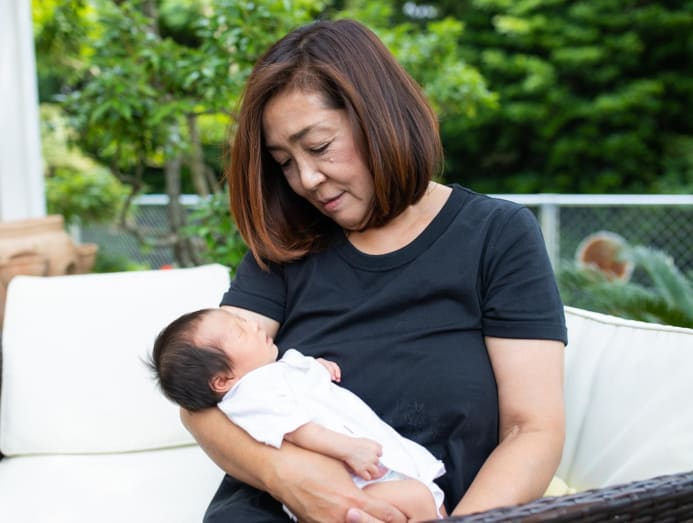
THE CONS
Potential friction. While it might be great to have someone you trust by your side, it may lead to clashes at times. For instance, an older person might insist you follow certain outdated confinement practices.
DOING IT ON YOUR OWN
With apartments becoming smaller, space- and budget-conscious couples often opt to do it themselves during the confinement period.
“Both space and cost were factors we considered, but ultimately, it was the space constraint that led us to our decision of doing confinement ourselves,” said Celeste Cordeiro, lawyer and mother of two.
“We felt that the confinement nanny should have a proper area to rest, but unfortunately, our current place did not have the space for it. Besides, being second-time parents, we weren’t as nervous about doing it on our own this round,” she added.
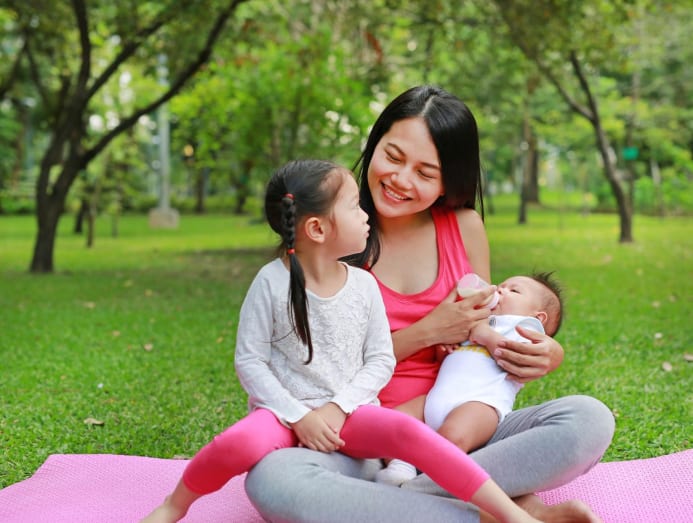
Good news for parents-to-be, fathers get Government-Paid Paternity Leave – currently two weeks, and doubling to four weeks from April 1, 2025 – allowing husbands to be around for the confinement period.
There is also Shared Parental Leave, which must be taken within your child’s first year. This is currently four weeks and will increase to six weeks from April 1, 2025, and then to 10 weeks from April 1, 2026.
THE PROS
Confinement food delivery. This takes away the stress of food prep and cooking. Besides ensuring your meals are nutritious, some providers also offer bird’s nest and lactation cookies as add-ons.
Complete independence. With no one to answer to during your confinement period, you’re free to make whatever decisions you feel are best for you and your newborn – no more sneaking in hair washes when your confinement nanny or mum is busy.
THE CONS
Steep learning curve. With no prior experience, new mothers (or new parents) may struggle with caring for a newborn.
Insufficient rest. Needing to handle everything, from infant care to keeping house is not easy. It could be worse if you have older children and elderly parents to care for. And while you might be able to power through the lack of sleep, having insufficient rest may affect your breast milk supply.
Spousal conflicts. A sensitive and stressful time for first-time parents, it can inevitably result in conflicts. Even you’re an experienced parent, having a new child changes the family and spousal dynamic.
Ultimately, have realistic expectations if you’re going DIY, said Cordeiro. “The house will be messy, things may not go according to plan, your experience may be very different from what you read, see and have been told by friends. But just roll with it and do the best that you can.”
CNA Women is a section on CNA Lifestyle that seeks to inform, empower and inspire the modern woman. If you have women-related news, issues and ideas to share with us, email CNAWomen [at] mediacorp.com.sg (CNAWomen[at]mediacorp[dot]com[dot]sg).













